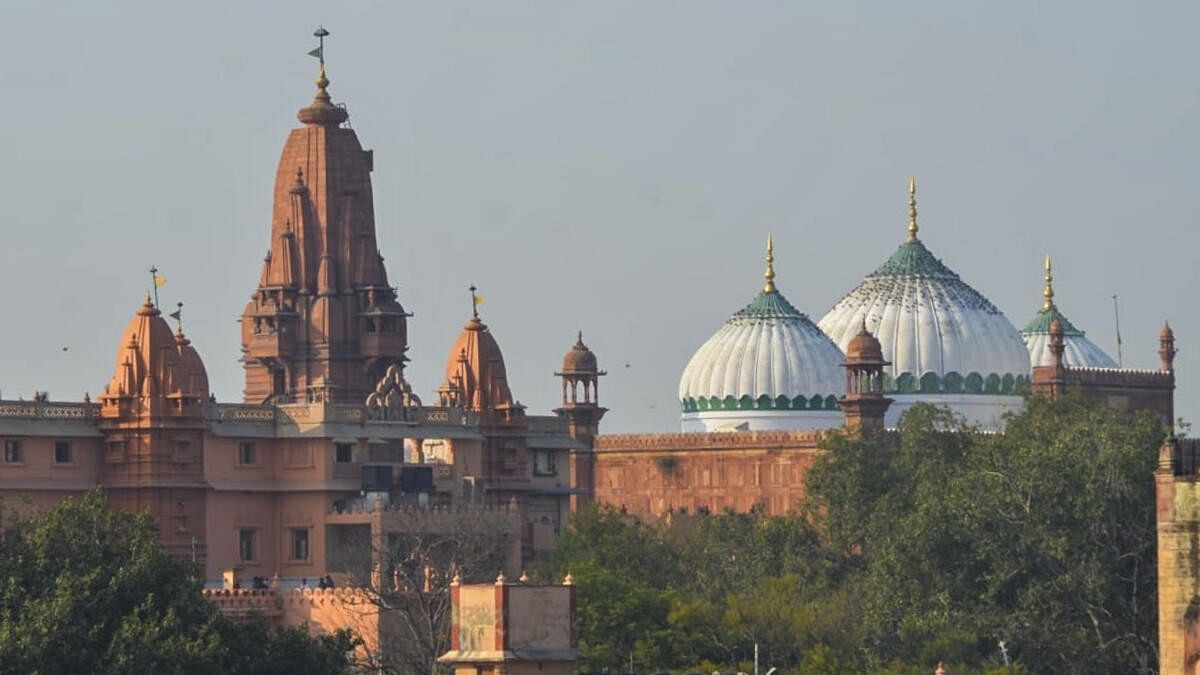
File photo of Shahi Idgah mosque and Shri Krishna Janmabhoomi Temple, in Mathura.
Credit: PTI File Photo
Prayagraj: The Hindu side in the Krishna Janmabhoomi-Shahi Idgah case on Thursday told the Allahabad High Court that till date no documents regarding ownership of the property in dispute has been provided either by the Sunny Central Waqf Board or by the mosque committee.
The counsel for the Hindu side also submitted that even no electricity connection is in their (Waqf Board and mosque committee) name as they are 'illegally' using power and an FIR has also been lodged against them by the electricity department.
The submissions were made during the hearing of a plea challenging the suit seeking 'removal' of the Shahi Idgah mosque adjacent to the Krishna Janmabhoomi temple in Mathura.
The matter is being heard by Justice Mayank Kumar Jain on the plea moved by the Muslim side regarding the maintainability of the suit.
The high court fixed May 20 for further hearing in the case.
On Wednesday, the Hindu side argued that the claimed compromise made in 1968 between the two sides was a 'fraud' by Sunni Central Waqf Board and the mosque committee.
The Hindu side had also submitted that the property belongs to deity Katra Keshav Deo for more than 1,000 years and that the birthplace of Lord Krishna was demolished in the 16th century and a 'chabutara' (platform) was constructed as Idgah.
Advocate Taslima Aziz Ahmadi, appearing for the Muslim side through video conferencing on Wednesday, again told the court that the suit is barred by limitation. As per her, the two parties had entered into a 'compromise' on October 12, 1968 and the said compromise was confirmed in a civil suit decided in 1974.
Ahmadi said that the limitation to challenge a compromise is three years, but the present suit has been filed in 2020 and thus it is barred by limitation.
She further submitted that the suit has been filed for possession after removal of the structure of Shahi Idgah as well as for restoration of a temple.
Ahmadi said the prayer in the suit shows the structure of the Idgah is there and the mosque management committee is in possession of the same.
From the Hindu side, it was earlier argued that the suit is maintainable and the plea regarding non-maintainability can only be decided after leading evidences. The application moved by the Muslim side under Order 7 Rule 11 of Civil Procedure Code raising question on maintainability of the suit is liable to be rejected, it said.
The Hindu side counsel had further submitted that in the claimed compromise in 1968 the deity was not a party nor a party in the court decree passed in 1974.
The Hindu side also argued that the deity was not a party in the claimed compromise between the two sides in 1968 or in the court decree passed in 1974.
The counsel for the Hindu side had also said that the claimed compromise was made by Sri Krishna Janmasthan Seva Sansthan, which was not empowered to enter into any such pact.